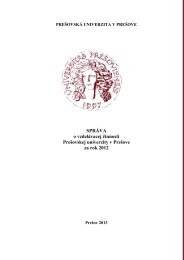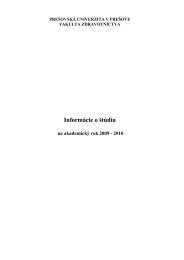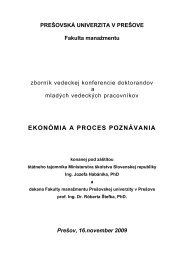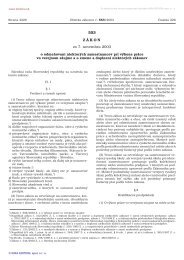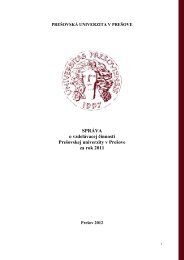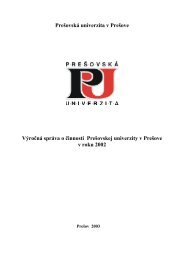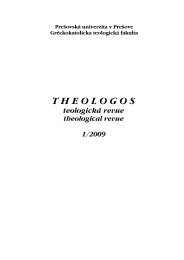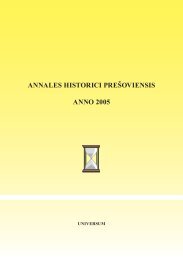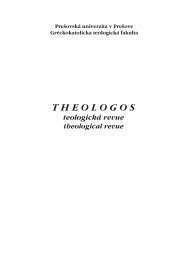- Page 1 and 2:
Prešovská univerzita v Prešove G
- Page 3 and 4:
Obsah Baán István The Orthodox an
- Page 5 and 6:
v Prešove, Gréckokatolícka teolo
- Page 7 and 8:
Ľubomír Petrík The Need for Dial
- Page 9 and 10:
THEOLOGOS 1/2012 | ŠTÚDIE The Ort
- Page 11 and 12:
THEOLOGOS 1/2012 | ŠTÚDIE small r
- Page 13 and 14:
THEOLOGOS 1/2012 | ŠTÚDIE June 17
- Page 15 and 16:
THEOLOGOS 1/2012 | ŠTÚDIE should
- Page 17 and 18:
THEOLOGOS 1/2012 | ŠTÚDIE studyin
- Page 19 and 20:
THEOLOGOS 1/2012 | ŠTÚDIE Rome, a
- Page 21 and 22:
THEOLOGOS 1/2012 | ŠTÚDIE The pla
- Page 23 and 24:
THEOLOGOS 1/2012 | ŠTÚDIE in the
- Page 25 and 26:
THEOLOGOS 1/2012 | ŠTÚDIE two in
- Page 27 and 28:
THEOLOGOS 1/2012 | ŠTÚDIE La Fest
- Page 29 and 30:
THEOLOGOS 1/2012 | ŠTÚDIE Più ta
- Page 31 and 32:
THEOLOGOS 1/2012 | ŠTÚDIE di Misk
- Page 33 and 34:
THEOLOGOS 1/2012 | ŠTÚDIE Infatti
- Page 35 and 36:
THEOLOGOS 1/2012 | ŠTÚDIE affinch
- Page 37 and 38:
THEOLOGOS 1/2012 | ŠTÚDIE posso p
- Page 39 and 40: THEOLOGOS 1/2012 | ŠTÚDIE 3.2. Il
- Page 41 and 42: THEOLOGOS 1/2012 | ŠTÚDIE è buon
- Page 43 and 44: THEOLOGOS 1/2012 | ŠTÚDIE SZMANDR
- Page 45 and 46: THEOLOGOS 1/2012 | ŠTÚDIE Das Chr
- Page 47 and 48: THEOLOGOS 1/2012 | ŠTÚDIE Der rel
- Page 49 and 50: THEOLOGOS 1/2012 | ŠTÚDIE man an
- Page 51 and 52: THEOLOGOS 1/2012 | ŠTÚDIE analogi
- Page 53 and 54: THEOLOGOS 1/2012 | ŠTÚDIE in Prag
- Page 55 and 56: THEOLOGOS 1/2012 | ŠTÚDIE Josef H
- Page 57 and 58: THEOLOGOS 1/2012 | ŠTÚDIE „Krei
- Page 59 and 60: THEOLOGOS 1/2012 | ŠTÚDIE und in
- Page 61 and 62: THEOLOGOS 1/2012 | ŠTÚDIE zusamme
- Page 63 and 64: THEOLOGOS 1/2012 | ŠTÚDIE einem s
- Page 65 and 66: THEOLOGOS 1/2012 | ŠTÚDIE Regiona
- Page 67 and 68: THEOLOGOS 1/2012 | ŠTÚDIE te - mi
- Page 69 and 70: THEOLOGOS 1/2012 | ŠTÚDIE mniej w
- Page 71 and 72: THEOLOGOS 1/2012 | ŠTÚDIE wartoś
- Page 73 and 74: THEOLOGOS 1/2012 | ŠTÚDIE gii poz
- Page 75 and 76: THEOLOGOS 1/2012 | ŠTÚDIE różny
- Page 77 and 78: THEOLOGOS 1/2012 | ŠTÚDIE dego cz
- Page 79 and 80: THEOLOGOS 1/2012 | ŠTÚDIE Chrystu
- Page 81 and 82: THEOLOGOS 1/2012 | ŠTÚDIE Ofiara
- Page 83 and 84: THEOLOGOS 1/2012 | ŠTÚDIE jak i p
- Page 85 and 86: THEOLOGOS 1/2012 | ŠTÚDIE Czynny
- Page 87 and 88: THEOLOGOS 1/2012 | ŠTÚDIE święc
- Page 89: THEOLOGOS 1/2012 | ŠTÚDIE giczne.
- Page 93 and 94: THEOLOGOS 1/2012 | ŠTÚDIE się r
- Page 95 and 96: THEOLOGOS 1/2012 | ŠTÚDIE W wieka
- Page 97 and 98: THEOLOGOS 1/2012 | ŠTÚDIE skich 2
- Page 99 and 100: THEOLOGOS 1/2012 | ŠTÚDIE Inspira
- Page 101 and 102: THEOLOGOS 1/2012 | ŠTÚDIE materii
- Page 103 and 104: THEOLOGOS 1/2012 | ŠTÚDIE zenie P
- Page 105 and 106: THEOLOGOS 1/2012 | ŠTÚDIE no spir
- Page 107 and 108: THEOLOGOS 1/2012 | ŠTÚDIE jakimi
- Page 109 and 110: THEOLOGOS 1/2012 | ŠTÚDIE 109
- Page 111 and 112: THEOLOGOS 1/2012 | ŠTÚDIE Pielgrz
- Page 113 and 114: THEOLOGOS 1/2012 | ŠTÚDIE • sac
- Page 115 and 116: THEOLOGOS 1/2012 | ŠTÚDIE społec
- Page 117 and 118: THEOLOGOS 1/2012 | ŠTÚDIE nia tak
- Page 119 and 120: THEOLOGOS 1/2012 | ŠTÚDIE Geograf
- Page 121 and 122: THEOLOGOS 1/2012 | ŠTÚDIE ja tury
- Page 123 and 124: THEOLOGOS 1/2012 | ŠTÚDIE nepřij
- Page 125 and 126: THEOLOGOS 1/2012 | ŠTÚDIE rý chc
- Page 127 and 128: THEOLOGOS 1/2012 | ŠTÚDIE ťansko
- Page 129 and 130: THEOLOGOS 1/2012 | ŠTÚDIE ve své
- Page 131 and 132: THEOLOGOS 1/2012 | ŠTÚDIE nalytic
- Page 133 and 134: THEOLOGOS 1/2012 | ŠTÚDIE morálk
- Page 135 and 136: THEOLOGOS 1/2012 | ŠTÚDIE kteří
- Page 137 and 138: THEOLOGOS 1/2012 | ŠTÚDIE tické
- Page 139 and 140: THEOLOGOS 1/2012 | ŠTÚDIE Dokumen
- Page 141 and 142:
THEOLOGOS 1/2012 | ŠTÚDIE WATT, W
- Page 143 and 144:
THEOLOGOS 1/2012 | ŠTÚDIE popri C
- Page 145 and 146:
THEOLOGOS 1/2012 | ŠTÚDIE Rozum a
- Page 147 and 148:
THEOLOGOS 1/2012 | ŠTÚDIE ti. Kat
- Page 149 and 150:
THEOLOGOS 1/2012 | ŠTÚDIE a Cirkv
- Page 151 and 152:
THEOLOGOS 1/2012 | ŠTÚDIE (†885
- Page 153 and 154:
THEOLOGOS 1/2012 | ŠTÚDIE Služba
- Page 155 and 156:
THEOLOGOS 1/2012 | ŠTÚDIE cia ako
- Page 157 and 158:
THEOLOGOS 1/2012 | ŠTÚDIE Prvou j
- Page 159 and 160:
THEOLOGOS 1/2012 | ŠTÚDIE d. Kate
- Page 161 and 162:
THEOLOGOS 1/2012 | ŠTÚDIE Inkultu
- Page 163 and 164:
THEOLOGOS 1/2012 | ŠTÚDIE kultúr
- Page 165 and 166:
THEOLOGOS 1/2012 | ŠTÚDIE nie, kt
- Page 167 and 168:
THEOLOGOS 1/2012 | ŠTÚDIE aj tým
- Page 169 and 170:
THEOLOGOS 1/2012 | ŠTÚDIE Podobne
- Page 171 and 172:
THEOLOGOS 1/2012 | ŠTÚDIE spôsob
- Page 173 and 174:
THEOLOGOS 1/2012 | ŠTÚDIE dráma
- Page 175 and 176:
THEOLOGOS 1/2012 | ŠTÚDIE jeden z
- Page 177 and 178:
THEOLOGOS 1/2012 | ŠTÚDIE až to,
- Page 179 and 180:
THEOLOGOS 1/2012 | ŠTÚDIE k pravd
- Page 181 and 182:
THEOLOGOS 1/2012 | ŠTÚDIE javí a
- Page 183 and 184:
THEOLOGOS 1/2012 | ŠTÚDIE rôznyc
- Page 185 and 186:
THEOLOGOS 1/2012 | ŠTÚDIE tý Duc
- Page 187 and 188:
THEOLOGOS 1/2012 | ŠTÚDIE my sami
- Page 189 and 190:
THEOLOGOS 1/2012 | ŠTÚDIE mu neub
- Page 191 and 192:
THEOLOGOS 1/2012 | ŠTÚDIE som sa
- Page 193 and 194:
THEOLOGOS 1/2012 | ŠTÚDIE LISTOK.
- Page 195 and 196:
THEOLOGOS 1/2012 | ŠTÚDIE stu, kt
- Page 197 and 198:
THEOLOGOS 1/2012 | ŠTÚDIE otvára
- Page 199 and 200:
THEOLOGOS 1/2012 | ŠTÚDIE Židovs
- Page 201 and 202:
THEOLOGOS 1/2012 | ŠTÚDIE Ďalšo
- Page 203 and 204:
THEOLOGOS 1/2012 | ŠTÚDIE nie. A
- Page 205 and 206:
THEOLOGOS 1/2012 | ŠTÚDIE tívnej
- Page 207 and 208:
THEOLOGOS 1/2012 | ŠTÚDIE Hoci sa
- Page 209 and 210:
THEOLOGOS 1/2012 | ŠTÚDIE zákon,
- Page 211 and 212:
THEOLOGOS 1/2012 | ŠTÚDIE znať o
- Page 213 and 214:
THEOLOGOS 1/2012 | ŠTÚDIE Táto s
- Page 215 and 216:
THEOLOGOS 1/2012 | ŠTÚDIE 3.1 Soc
- Page 217 and 218:
THEOLOGOS 1/2012 | ŠTÚDIE 3.2 Roz
- Page 219 and 220:
THEOLOGOS 1/2012 | ŠTÚDIE STOTT,
- Page 221 and 222:
THEOLOGOS 1/2012 | ŠTÚDIE Exegi m
- Page 223 and 224:
THEOLOGOS 1/2012 | ŠTÚDIE komunik
- Page 225 and 226:
THEOLOGOS 1/2012 | ŠTÚDIE vé kon
- Page 227 and 228:
THEOLOGOS 1/2012 | ŠTÚDIE nom sve
- Page 229 and 230:
THEOLOGOS 1/2012 | ŠTÚDIE chceme
- Page 231 and 232:
THEOLOGOS 1/2012 | ŠTÚDIE Blinkal
- Page 233 and 234:
THEOLOGOS 1/2012 | ŠTÚDIE c) leg
- Page 235 and 236:
THEOLOGOS 1/2012 | ŠTÚDIE podstat
- Page 237 and 238:
THEOLOGOS 1/2012 | ŠTÚDIE zjaveni
- Page 239 and 240:
THEOLOGOS 1/2012 | ŠTÚDIE mu uver
- Page 241 and 242:
THEOLOGOS 1/2012 | ŠTÚDIE nia osl
- Page 243 and 244:
THEOLOGOS 1/2012 | ŠTÚDIE keď pr
- Page 245 and 246:
THEOLOGOS 1/2012 | ŠTÚDIE Fenomé
- Page 247 and 248:
THEOLOGOS 1/2012 | ŠTÚDIE 1 Poká
- Page 249 and 250:
THEOLOGOS 1/2012 | ŠTÚDIE Božieh
- Page 251 and 252:
THEOLOGOS 1/2012 | ŠTÚDIE A tak s
- Page 253 and 254:
THEOLOGOS 1/2012 | ŠTÚDIE 1.2 Ch
- Page 255 and 256:
THEOLOGOS 1/2012 | ŠTÚDIE Radiká
- Page 257 and 258:
THEOLOGOS 1/2012 | ŠTÚDIE Metafor
- Page 259 and 260:
THEOLOGOS 1/2012 | ŠTÚDIE do krá
- Page 261 and 262:
THEOLOGOS 1/2012 | ŠTÚDIE niektor
- Page 263 and 264:
THEOLOGOS 1/2012 | ŠTÚDIE osoby a
- Page 265 and 266:
THEOLOGOS 1/2012 | ŠTÚDIE sahujú
- Page 267 and 268:
THEOLOGOS 1/2012 | ŠTÚDIE Antropo
- Page 269 and 270:
THEOLOGOS 1/2012 | ŠTÚDIE inak ne
- Page 271 and 272:
THEOLOGOS 1/2012 | ŠTÚDIE Cholero
- Page 273 and 274:
THEOLOGOS 1/2012 | ŠTÚDIE mali by
- Page 275 and 276:
THEOLOGOS 1/2012 | ŠTÚDIE Priebeh
- Page 277 and 278:
THEOLOGOS 1/2012 | ŠTÚDIE Cholera
- Page 279 and 280:
THEOLOGOS 1/2012 | ŠTÚDIE katolí
- Page 281 and 282:
THEOLOGOS 1/2012 | ŠTÚDIE Juskov
- Page 283 and 284:
THEOLOGOS 1/2012 | ŠTÚDIE Davidov
- Page 285 and 286:
THEOLOGOS 1/2012 | ŠTÚDIE Schemat
- Page 287 and 288:
THEOLOGOS 1/2012 | ŠTÚDIE Už mn
- Page 289 and 290:
THEOLOGOS 1/2012 | ŠTÚDIE Ako dru
- Page 291 and 292:
THEOLOGOS 1/2012 | ŠTÚDIE -véda
- Page 293 and 294:
THEOLOGOS 1/2012 | ŠTÚDIE Hinduis
- Page 295 and 296:
THEOLOGOS 1/2012 | ŠTÚDIE uskuto
- Page 297 and 298:
THEOLOGOS 1/2012 | ŠTÚDIE Budhizm
- Page 299 and 300:
THEOLOGOS 1/2012 | ŠTÚDIE To znam
- Page 301 and 302:
THEOLOGOS 1/2012 | ŠTÚDIE pre Vi
- Page 303 and 304:
THEOLOGOS 1/2012 | ŠTÚDIE KARDIS,
- Page 305 and 306:
THEOLOGOS 1/2012 | ŠTÚDIE Táto s
- Page 307 and 308:
THEOLOGOS 1/2012 | ŠTÚDIE pečný
- Page 309 and 310:
THEOLOGOS 1/2012 | ŠTÚDIE Je zak
- Page 311 and 312:
THEOLOGOS 1/2012 | ŠTÚDIE to poky
- Page 313 and 314:
THEOLOGOS 1/2012 | ŠTÚDIE medzi m
- Page 315 and 316:
THEOLOGOS 1/2012 | ŠTÚDIE Muhamma
- Page 317 and 318:
THEOLOGOS 1/2012 | ŠTÚDIE a návr
- Page 319 and 320:
THEOLOGOS 1/2012 | RECENZIE RECENZI
- Page 321 and 322:
THEOLOGOS 1/2012 | RECENZIE skom zv
- Page 323 and 324:
THEOLOGOS 1/2012 | RECENZIE aj urč
- Page 325 and 326:
THEOLOGOS 1/2012 | RECENZIE a evanj
- Page 327 and 328:
THEOLOGOS 1/2012 | RECENZIE ky sa t
- Page 329 and 330:
THEOLOGOS 1/2012 | RECENZIE veda ne
- Page 331 and 332:
THEOLOGOS 1/2012 | RECENZIE ťaťa,
- Page 333 and 334:
THEOLOGOS 1/2012 | RECENZIE dostali
- Page 335 and 336:
THEOLOGOS 1/2012 | RECENZIE perform
- Page 337 and 338:
THEOLOGOS 1/2012 | RECENZIE ti svoj
- Page 339 and 340:
THEOLOGOS 1/2012 | RECENZIE die rel
- Page 341 and 342:
THEOLOGOS 1/2012 | RECENZIE citačn
- Page 343:
THEOLOGOS 1/2012 | ADDRESSES OF AUT



